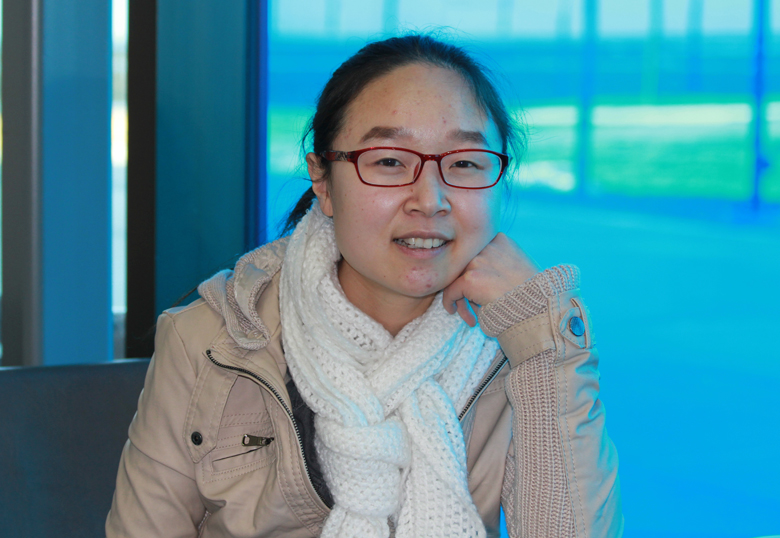In a first for the University of Lethbridge, Yanjun Shi (BA ’14) has been chosen as one of 13 Alberta graduate students to receive the prestigious Alberta SPOR Graduate Studentship in Patient-Oriented Research. The award will provide her with $30,000 in funding for one year, along with mentoring and training opportunities in patient-oriented research.
“I am very grateful to have received this award and for the support and encouragement from my supervisor, Dr. Bonnie Lee,” says Shi. “I’m excited to get started but also aware of the challenges with this project.”

Shi is currently in her first year of a Masters of Education in Counselling Psychology with a focus on mental health and addiction. Her thesis project will be carried out in conjunction with Lee’s principal research study, which involves comparing the outcomes of Couples Congruence Therapy (CCT) and treatment-as-usual (TAU) approaches within two Alberta Health Services sites for couples coping with alcohol and/or gambling addiction. The participating couples have at least one partner who has an alcohol and/or gambling addiction. Shi’s study, called Patient Engagement in Gauging the Relational Gap in Addiction Treatment, is aimed at learning patient perspectives on couples therapy in addiction treatment. The benefit of couples therapy in aiding addiction recovery is well supported by research evidence, but it is not widely implemented in addiction services. By studying the participating couples in Lee’s principal project, Shi hopes to better understand the counselling needs for couples with addiction problems.
Research shows that many people who have addiction problems also have family and couple relationship difficulties, says Shi. In couples where one partner has an addiction, the non-addicted partner also deals with a great deal of social and psychological distress. It is not uncommon for couples who go into couples therapy to present with addiction-related problems.
In her study, Shi will use surveys post-treatment to look at the couples’ motivations, expectations and past experiences of couples seeking counselling and addiction services. She will also conduct interviews with the couples after they have completed CCT and TAU to explore their treatment experiences.
“I’m expecting to find out if there is strong need for better access and greater implementation of couples therapy in addiction services. Then I want to find out what these participating couples found helpful or beneficial and effective during treatment for their addiction recovery and couple relationship recovery,” she says.
The patient-engagement portion of Shi’s study involves recruiting four to six former patients who have accessed Alberta Health Services addiction services and have sought couples counselling while coping with addiction problems. These people will serve as a kind of advisory board, giving input on the design of Shi’s survey questionnaire and interview questions. The patient advisors will also review the executive summary of the findings and give feedback.
Shi’s interest in counselling was sparked when she was a high school student in China.
“When I was a teenager, I liked to read books on Freud’s theories and psychotherapy,” she says. “Initially, when I thought about psychology, I was thinking about counselling. The psychology here at the U of L was research oriented so that was where my research career started. Now, I have this great opportunity to bridge counselling and research in psychology."
Seven years ago, Shi left China and came to the U of L to pursue undergraduate studies.
“At first, I was advised to apply for the neuroscience program but I took a few turns and graduated with a psychology major. I went to study foreign languages first—French and Spanish. Then, I took a few neuroscience courses as part of my psychology major. With my language background, I worked with Dr. Fangfang Li, whose research focused on language acquisition and speech development, and completed my undergraduate thesis with her supervision.”
Following the completion of her BA, Shi’s passion for counselling was rekindled when she met Lee.
“If it hadn’t been for Bonnie opening the door for me to CCT and involved me in her research project on immigrant families and culture, I wouldn’t be able to get into counselling psychology at all,” she says. “I’m thankful to both Bonnie and Fangfang; they both gave me a reference to this program and they are both my very significant mentors.”
Although Shi hasn’t yet decided what her next steps will be after finishing her master’s, she did share some of her long-term goals.
“Eventually, I want to help improve the knowledge exchange between Canada and China in mental health and counselling. When I lived in China, counselling services were hard to find,” she says. “I think I can help out and contribute in developing counselling psychology in my home country.”
The Alberta SPOR Graduate Studentship supports students enrolled in a thesis-based master’s or doctoral program at an Alberta university an opportunity to conduct health-related research with a patient-oriented approach. The Alberta SPOR SUPPORT Unit is jointly funded by Canadian Institutes of Health Research (CIHR) and Alberta Innovates.
